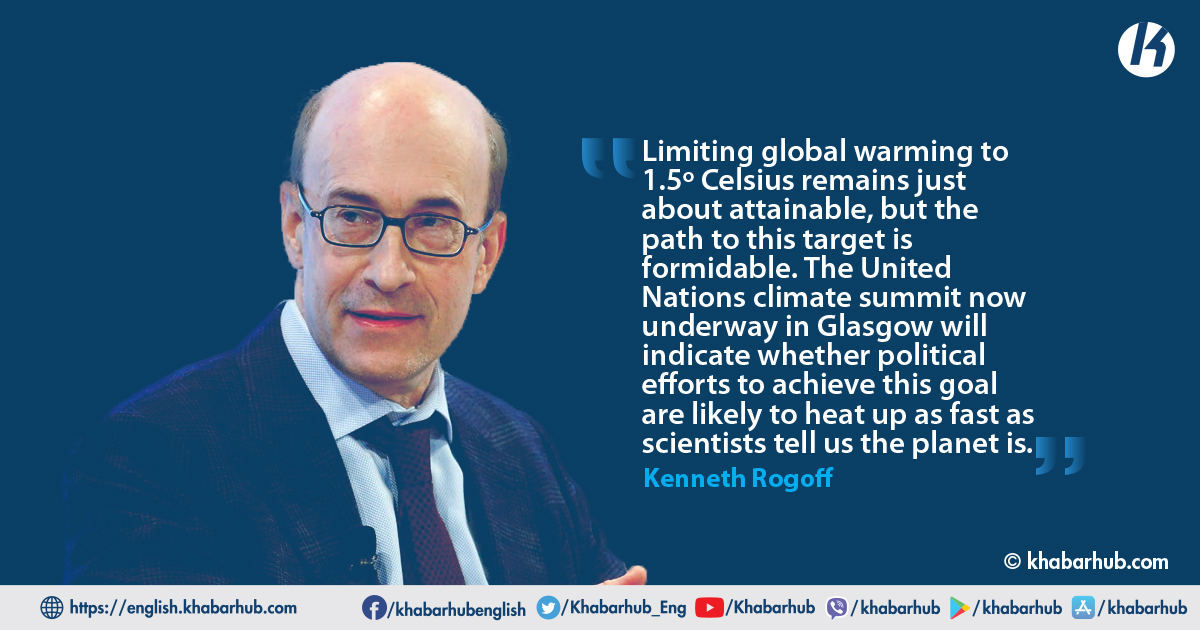As world leaders gather at the United Nations Climate Change Conference (COP26) in Glasgow, there is tremendous ebullience about the potential of green energy sources.
But the hard fact is that fossil fuels still account for 80% of global energy, as they did when governments signed the Paris climate agreement to much fanfare at COP21 six years ago.
And even though many economies have not yet returned to their pre-pandemic GDP level, the world is on track in 2021 to post its second-largest annual increase in carbon dioxide emissions on record.
True, the International Energy Agency’s recent flagship World Energy Outlook report, which remains the gold standard of energy analysis, strikes an optimistic note by placing greater emphasis on what can be done to limit global warming.
But at the same time, “keeping the door to 1.5°C open” seems to involve so many moving parts, innovations, adaptations, and, yes, sacrifices, that it is hard to see how it will work without the global carbon price most economists regard as necessary.
In particular, a carbon tax simultaneously incentivizes and coordinates emissions-reduction efforts, and allocates resources accordingly, in ways that state planners simply cannot achieve.
Convincing policymakers and the public to confront those choices is not easy. A lack of wind this past summer has contributed to the current energy crisis in Europe, where leaders are now hoping that Russian President Vladimir Putin will provide the region with more natural gas.
The idea of a carbon tax remains political anathema in the United States; it briefly came to the fore in the recent budget negotiations but was dropped like a hot potato.
Instead, President Joe Biden will promote a mélange of measures – such as a shift to electric cars and an end to fossil-fuel development – that are mostly good ideas, but together are vastly more expensive and less efficient than a carbon tax.
The European Union, with its Emissions Trading System (a cap-and-trade alternative to a carbon tax), has made more progress on carbon pricing.
Even so, the scheme currently covers only about 50% of the EU’s greenhouse-gas emissions and gives many allowances for free.
No wonder, then, that policymakers in emerging and low-income economies react so cynically when they are asked to risk slowing down their countries’ economic development in order to help combat climate change.
Many of them instead ask why global climate accords do not push all countries to achieve similar levels of per capita emissions.
Even if a global carbon tax magically came to pass, the world would still need a mechanism for transferring resources and know-how to developing economies to prevent them from becoming the major emitters of the future. I have promoted the idea of establishing a dedicated World Carbon Bank that would house technical expertise, facilitate the exchange of best practices, and help channel hundreds of billions of dollars in grants and loans to lower-income countries.
Buy-in from developing countries is essential. Coal, which accounts for 30% of global CO2 emissions, is cheap and plentiful in countries such as India and China.
Although 21 countries have pledged to phase out coal-fired power, nearly all of them are in Europe, and they account for only about 5% of the world’s coal-fired power stations. China’s recent pledge to stop building new coal plants abroad is a good start.
But China itself produces more than half of the world’s coal-fired power, and many other countries, such as Vietnam, will presumably now build more coal plants on their own.
Moreover, even with a carbon tax, regulators will still have to tackle myriad issues, such as deciding where wind turbines can be built, how legacy coal-powered electricity plants can be phased out, and to what extent natural gas can be used as a transitional energy source.
Because wind and solar are intermittent energy sources, there is a strong case for a renewed push to ramp up nuclear power.
In any event, even if advanced economies – perhaps including the US and recalcitrant Australia – ban fossil-fuel exploration, less developed economies will still have powerful incentives to expand the exploitation of their own CO2-emitting resources.
This would involve using much safer modern technologies to build both large-scale power plants and the kind of small-scale generators used in nuclear submarines.
Green political parties may cringe at such an idea, but climate literacy needs to be married with energy literacy. Achieving “net-zero” CO2 emissions by 2050, by which time the world may have two billion more people than it does now, requires some hard choices.
Convincing policymakers and the public to confront those choices is not easy. A lack of wind this past summer has contributed to the current energy crisis in Europe, where leaders are now hoping that Russian President Vladimir Putin will provide the region with more natural gas.
Likewise, with energy prices set to soar this winter, Biden has implored OPEC countries to produce more oil, even as his administration attempts to reduce domestic fossil-fuel production.
Environmental, social, and governance investing, whose proponents aim to choke off capital for fossil-fuel investment, has been all the rage, and for a while even seemed to offer handsome returns. But with energy prices surging again, that may no longer be the case.
In any event, even if advanced economies – perhaps including the US and recalcitrant Australia – ban fossil-fuel exploration, less developed economies will still have powerful incentives to expand the exploitation of their own CO2-emitting resources.
It is encouraging that the IEA still sees limiting global warming to 1.5°C as an attainable target, even if the path is formidable.
Unfortunately, it remains very much in question whether political efforts to achieve this goal will heat up as fast as scientists tell us the planet is. When it comes to climate summits, therefore, one can only hope that the 26th time is the charm.
(Kenneth Rogoff is a Professor of Economics and Public Policy at Harvard University)









Comment